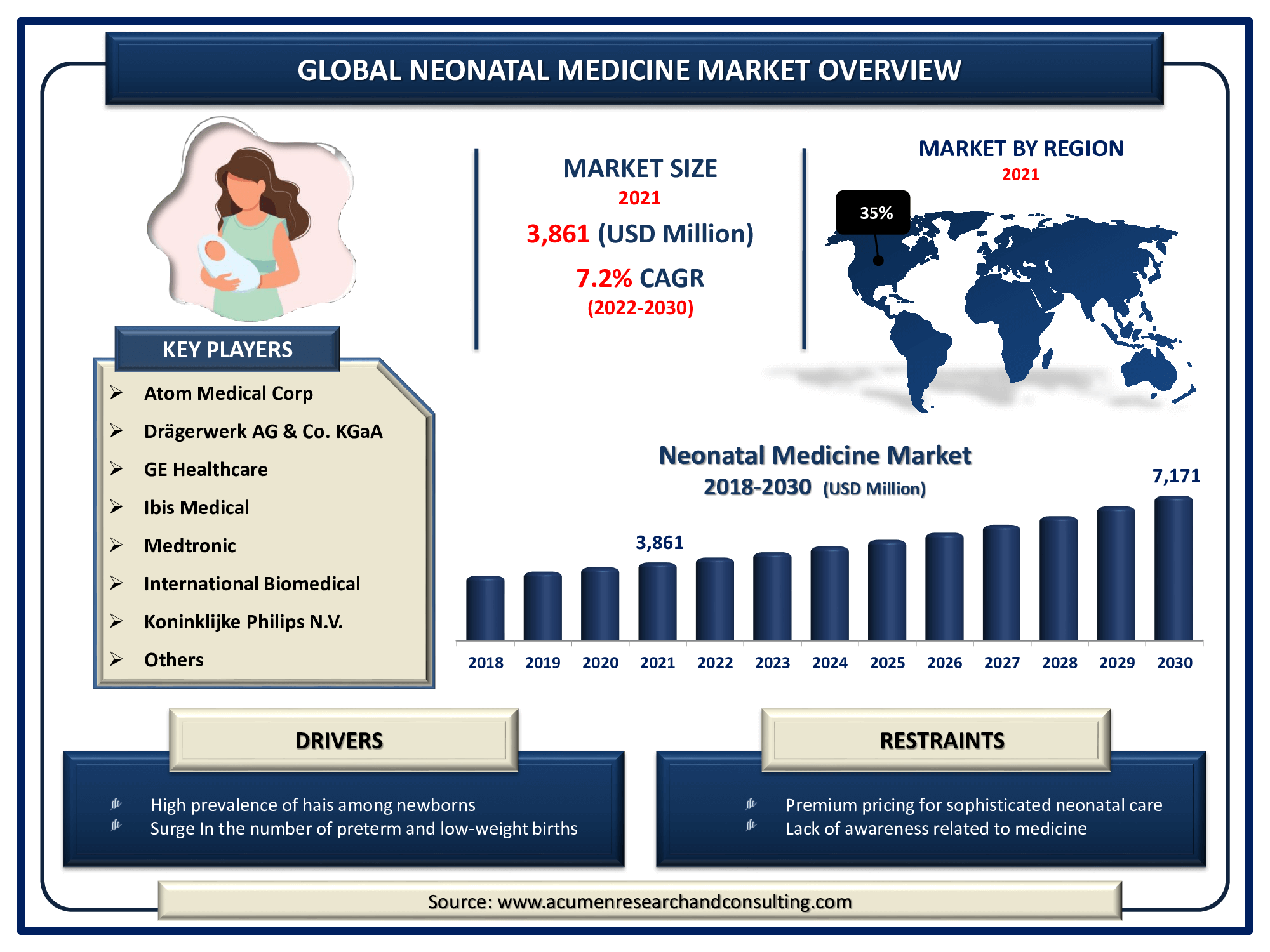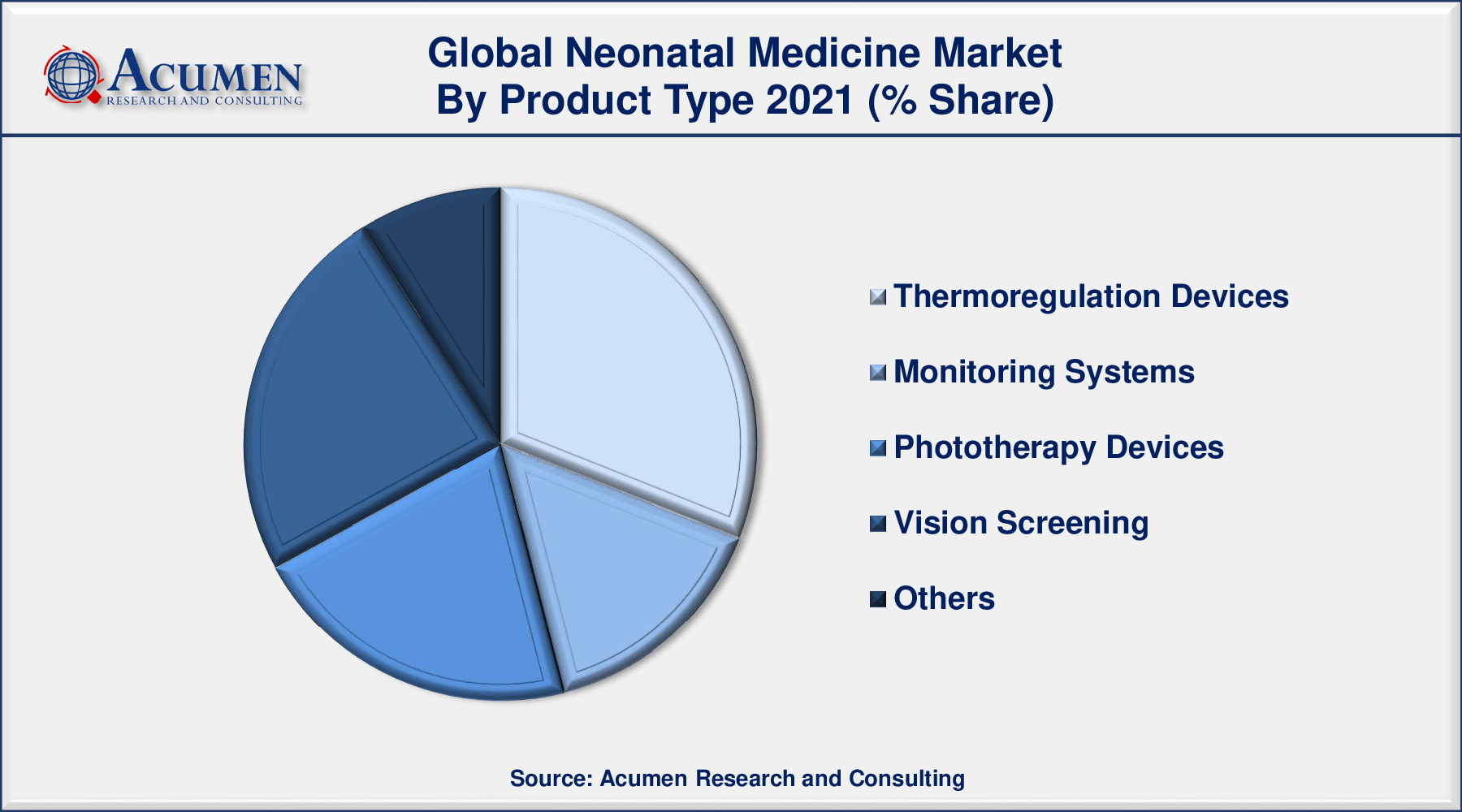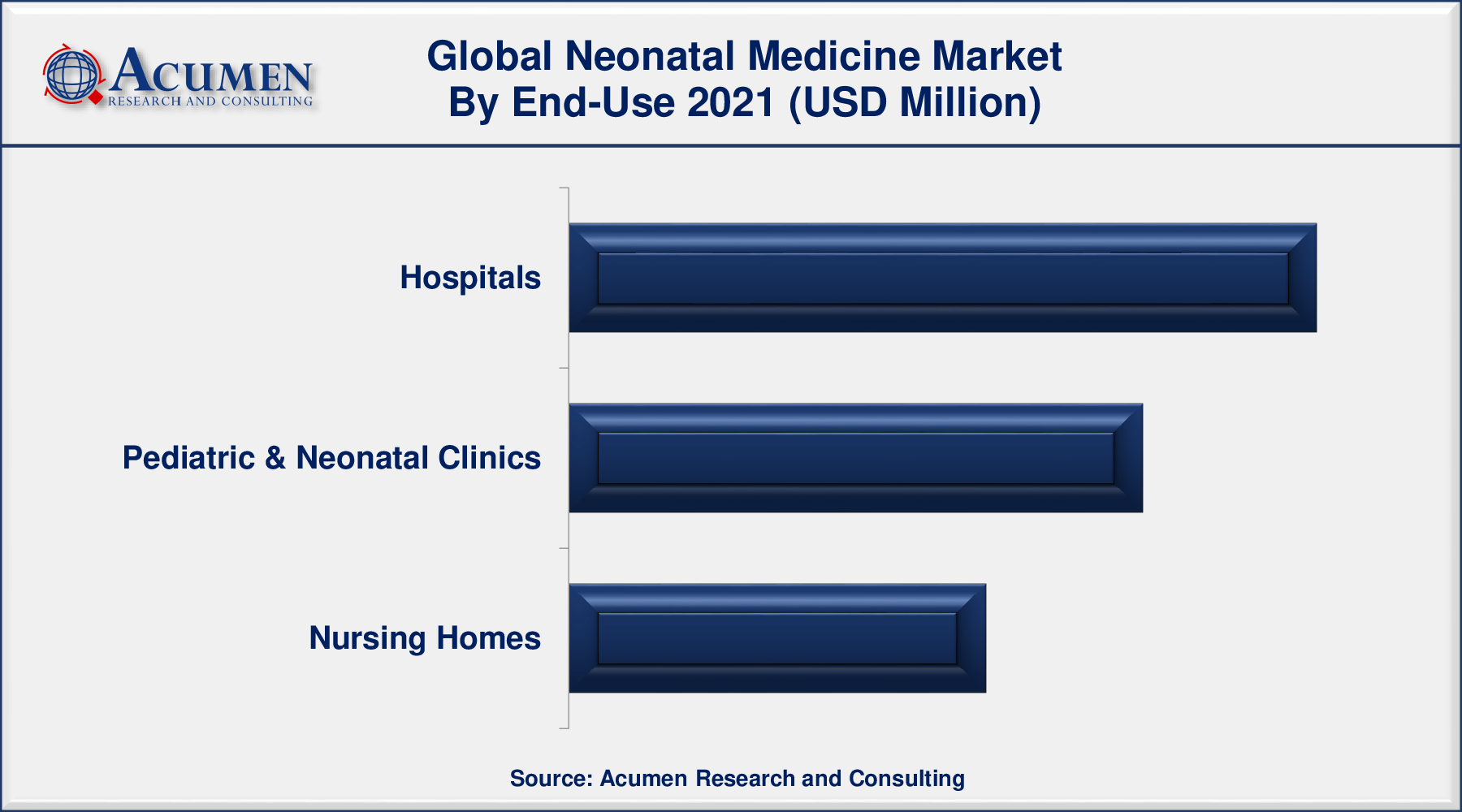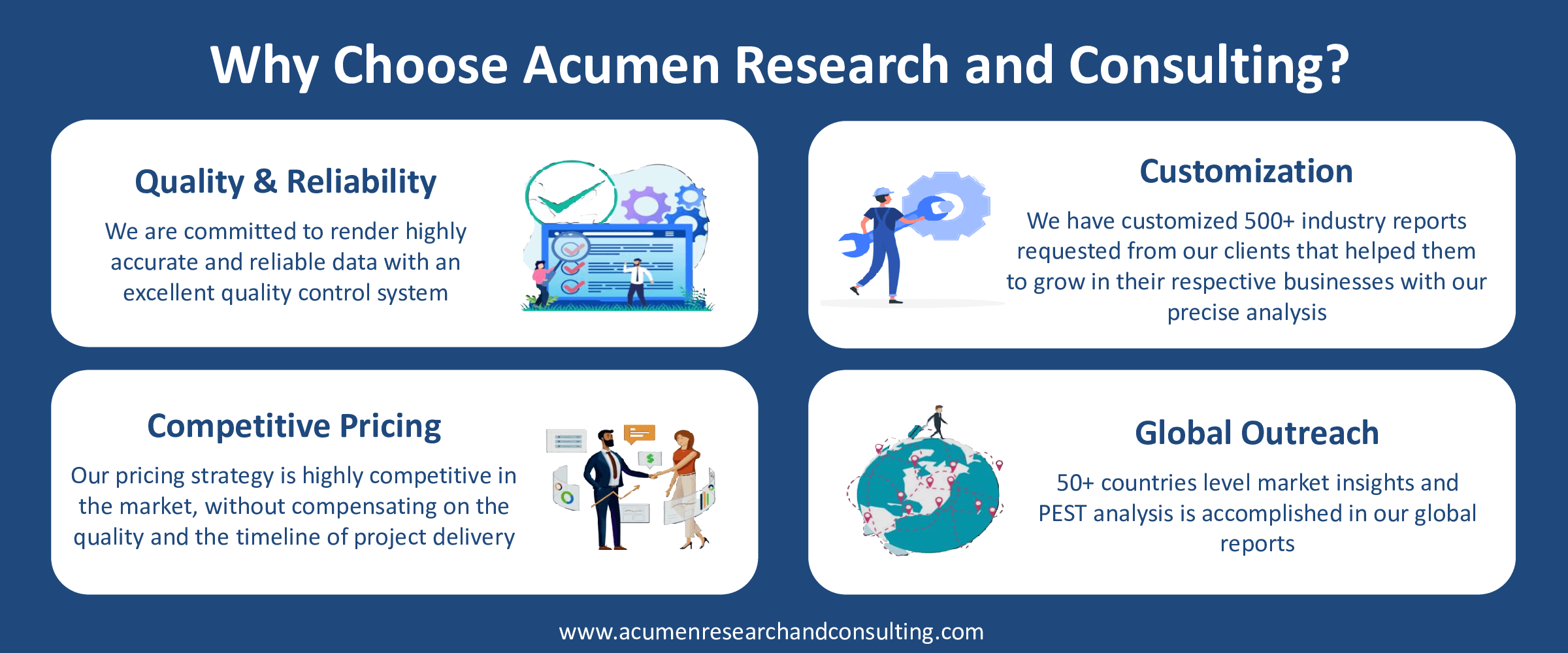Neonatal Medicine Market Size - Global Industry, Share, Analysis, Trends and Forecast 2022 - 2030
Published :
Report ID:
Pages :
Format :
Neonatal Medicine Market Size - Global Industry, Share, Analysis, Trends and Forecast 2022 - 2030
Report Coverage
- Industry Dynamics
- Market Size and Forecast Data
- Segment Analysis
- Competitive Landscape
- Regional Analysis with a Niche Focus on Country-Level Data
- High Level Analysis - Porter's, PESTEL, Value Chain, etc.
- Company Profiles of Key Players
- Option to Customize the Report As Per Your Specific Need
Request Sample Report
The Global Neonatal Medicine Market Size accounted for USD 3,861 Million in 2021 and is estimated to achieve a market size of USD 7,171 Million by 2030 growing at a CAGR of 7.2% from 2022 to 2030. The high prevalence of neonatal jaundice, an increasing number of preterm births, and the introduction of new products for use in the neonatal intensive care units (NICU) are expected to drive the neonatal medicine market value. Moreover, the neonatal medicine market growth is attributed to the increase in the number of neonatal healthcare facilities across the globe along with the increased awareness of neonatal and fetal care across developing nations.

Neonatal Medicine Market Report Key Highlights
- Global neonatal medicine market revenue is projected to expand by USD 7,171 million by 2030, with a 7.2% CAGR from 2022 to 2030.
- Based on end-use segment, hospital sector will account for more than 45% of overall market share in 2021
- Rising healthcare expenditures and the presence of large market participants in the region will improve U.S. neonatal medicine market
- According to the WHO, around 2.4 million children worldwide died in their first month of life in 2020
- Surge in the number of preterm and low-weight births drives the neonatal medicine market value
- Atom Medical Corp, Drägerwerk AG & Co. KGaA, Fisher & Paykel Healthcare Limited, GE Healthcare, etc are some of the key players operating in the industry
Neonatal or prenatal medicine is a subspecialty of pediatrics that concerns with care towards critically ill newborns and premature infants. Neonatologists diagnose and treat newborns suffering from conditions such as breathing disorders, infections, or birth defects, and coordinate care. Neonatologists medically manage newborns born prematurely, need surgery, critically ill, stabilize and treat newborns, and others. Globally, 2.4 million newborns died in the first month of life in 2019. There are approximately 7000 newborns deaths every day accounting to 47% of all children deaths under the age of 5 years according to the World Health Organization (WHO). However, there is a lot of substantial progress in neonates’ survival from the past records. The global neonatal deaths declined from 5.0 to 2.4 million in 2019.
Global Neonatal Medicine Market Dynamics
Market Drivers
- High prevalence of hais among newborns
- Growing adoption of neonatal care facilities worldwide
- Surge in the number of preterm and low-weight births
- Public-Private partnerships to improve healthcare facilities
Market Restraints
- Premium pricing for sophisticated neonatal care
- Lack of awareness related to medicine
Market Opportunities
- Development of multipurpose and integrated neonatal care technology
- The growing importance of neonatal medicines
Neonatal Medicine Market Report Coverage
| Market | Neonatal Medicine Market |
| Neonatal Medicine Market Size 2021 | USD 3,861 Million |
| Neonatal Medicine Market Forecast 2030 | USD 7,171 Million |
| Neonatal Medicine Market CAGR During 2022 - 2030 | 7.2% |
| Neonatal Medicine Market Analysis Period | 2018 - 2030 |
| Neonatal Medicine Market Base Year | 2021 |
| Neonatal Medicine Market Forecast Data | 2022 - 2030 |
| Segments Covered | By Product Type, By End-Use, And By Geography |
| Regional Scope | North America, Europe, Asia Pacific, Latin America, and Middle East & Africa |
| Key Companies Profiled | Atom Medical Corp, Drägerwerk AG & Co. KGaA, Fisher & Paykel Healthcare Limited, GE Healthcare, Ibis Medical, Medtronic, Natus Medical Incorporated, International Biomedical, Koninklijke Philips N.V., Phoenix Medical Systems Pvt Ltd, and Nice Neotech Medical Systems Pvt. Ltd. |
| Report Coverage |
Market Trends, Drivers, Restraints, Competitive Analysis, Player Profiling, Regulation Analysis |
Thermoregulation: Necessity For Sick Neonates And Infants
According to the American Family Physician, anemia is more prevalent in infants and children globally. During pregnancy and delivery up to 42% of pregnant women worldwide are suffering from anemia with a prevalence of 6% in North America. The iron requirement increases with each trimester and should be best supported by higher maternal iron intake. Between 60% and 80% of the iron storage in neonates occurs during the third trimester. Also, delays umbilical cord clamping (approx. 120 to 180 seconds after delivery) is associated with improved iron status at two to six months of age. These benefits play a vital role in those neonates suffering from iron deficiency such as infants and premature births. Therefore, infants in neonate’s intensive care unit (NICU) require treatment such as blood transfusion to treat anemic conditions in neonates. Sometimes neonates require transfusion of other blood products, called platelets or plasma to potentially treat dangerous bleeding problems.
Congenital Heart Diseases (CHDs): The Most Common Type Of Disease In Neonates
CHDs affect nearly 1% or about 40,000 births annually in the US alone according to the data released by the Centre for Disease Control and Prevention. About 1 in 4 babies suffer from CHDs. Infants with CHDs generally require surgery or other procedures in the first year of life. On the other hand, survival rate of CHDs is growing. About 97% of babies born with critical CHDs are expected to survive to one year of age. About 69% of babies born with critical CHDs are projected to survive to 18 years of age. There are several technological advancements that benefit neonate's survival from acute CHDs. Echocardiography is an important tool in diagnosis of CHDs in neonates. It provides proper consultation by the neonatologist and cardiologist. Transesophageal and transthoracic echocardiography’s are improvised imaging quality. New techniques such as tissue stain analysis and Doppler imaging is the newly introduced techniques.
Burden Of Sepsis:
In 2012, an estimated 6.9 million neonates suffer from possible serious bacterial infections occurring in South Asia, Sub-Saharan Africa, and Latin America. Moreover, in 2015, among the 5.941 million deaths were recorded among which 45% died in the neonatal period. Neonatal sepsis is the third most common cause of death in the age group with an estimated 0.401 million deaths in 2015, the vast majority of which are in developing countries. Integrated Management of Newborn and Childhood Illness (IMCI) recommend providing prophylactic intramuscular (IM) or intravenous (IV) ampicillin and gentamicin in neonates. As per the guidelines, treatment should be continued only if there are signs of sepsis.
Rising Number Of Preterm Birth Is Expected To Spur The Market Value
According to the WHO, an estimated 15 million babies are born too early that is more than 1 in 10 babies. Approx. 1 million children die annually due to complications of preterm birth. Globally, prematurity is the leading cause of death in neonates under the age of 5 years and in almost all countries with reliable data, preterm birth rates are increasing. Therefore, to avoid this more than three quarters of premature babies can be saved with feasible, cost-effective treatment, and providing care during child birth and in the postnatal period for every mother and baby. Provision of antenatal steroid injections (given to pregnant women at risk of preterm labor and under set criteria to strengthen the babies lungs), kangaroo mother care, and antibiotics to treat newborn infections. Continuity of the treatment is effective that has shown to reduce risk of prematurity by around 24%.
Neonatal Medicine Market Segmentation
The worldwide neonatal medicine market segmentation is based on the product type, end-use, and geography.
Neonatal Medicine Market By Product Type
- Thermoregulation Devices
- Monitoring Systems
- Phototherapy Devices
- Vision Screening
- Others

According to the neonatal medicine market forecast, the thermoregulation devices will record significant market share in the coming years. Thermoregulation is a critical function that is quite necessary when it comes to sick neonates or newborns. Hypothermia among the neonates raises the probability and risk of morbidity and mortality. Multiple techniques have been used to access thermoregulation in infants and to provide thermo-neutral environment to maintain normal body temperature in the neonates. In February 2014, GE Healthcare, announced launching of new product with its advanced suite of maternal infant care solutions. GE Healthcare develops solution to support a healthy developmental environmental at during pregnancy and all through first day of life for critical moments for the infants. In the Middle East, GE Healthcare launched Giraffe Omnibed, a highly specialized product offered for neonatal microenvironment that combines the thermal advantage of open bed radiant warmer. Additionally, new Giraffe Blue Spot PT Lite product provides high intensity phototherapy. The high intensity blue light with a narrow band of 430-490 nanometers offers excellent uniformity and makes clinically effective and flexible positioning that allows the caregivers to direct therapeutic light exactly on the infants body.
Neonatal Medicine Market By End-Use
- Hospitals
- Pediatric & Neonatal Clinics
- Nursing Homes

According to the neonatal medicine industry analysis, the hospital segment is likely to dominate the market in 2021. This is due to people preferring hospitals over clinics due to the availability of sophisticated technical equipment and an experienced workforce. Furthermore, as a large majority of births occur in hospital settings, the increase in the number of hospitals and the rise in demand for adequate medicine will fuel neonatal medicine market growth.
Neonatal Medicine Market Regional Outlook
North America
- U.S.
- Canada
Europe
- U.K.
- Germany
- France
- Spain
- Rest of Europe
Latin America
- Mexico
- Brazil
- Rest of Latin America
Asia-Pacific
- India
- Japan
- China
- Australia
- South Korea
- Rest of Asia-Pacific
The Middle East & Africa (MEA)
- Gulf Cooperation Council (GCC)
- South Africa
- Rest of the Middle East & Africa
North America Dominates The Neonatal Medicine Market
Based on regions, North America dominates the neonatal medicine market followed by Asia Pacific. Presence of major players in the US is one of the prominent factors that contribute for the regional market to grow. Rising healthcare expenditure and surge in product approvals will emboss considerable North American market share. Rising prevalence of neonate mortalities in the US, acts as a driving factor for North America region for neonatal medicine market. According to the National Vital Statistics Report, a total of 21,498 infant deaths were recorded in the US alone in 2018. The US neonatal death rate was 5.67 infant deaths per 1,000 live births, lower than the rate of 5.79 in 2017. Asia Pacific regional market will grow to its fullest by recording a significant CAGR in the forecast time frame. Japan is considered as one of the top highly favorable countries with respect to infant healthcare. Apart from that, technological advancements and high healthcare expenditure will foster the market growth in APAC region. As per the press release in May 2020, doctors in Japan have successfully transplanted liver cells derived from embryonic stem cells into newborn baby. This is one of the new treatment options for infants as the newborn was suffering from urea cycle disorder, where the liver is not capable enough to break down toxic ammonia.
Neonatal Medicine Market Players
Some of the top neonatal medicine market companies offered in the professional report include Atom Medical Corp, Drägerwerk AG & Co. KGaA, Fisher & Paykel Healthcare Limited, GE Healthcare, Ibis Medical, Medtronic, Natus Medical Incorporated, International Biomedical, Koninklijke Philips N.V., Phoenix Medical Systems Pvt Ltd, and Nice Neotech Medical Systems Pvt. Ltd. 
Frequently Asked Questions
What is the size of global neonatal medicine market in 2021?
The estimated value of global neonatal medicine market in 2021 was accounted to be USD 3,861 Million.
What is the CAGR of global neonatal medicine market during forecast period of 2022 to 2030?
The projected CAGR neonatal medicine market during the analysis period of 2022 to 2030 is 7.2%.
Which are the key players operating in the market?
The prominent players of the global neonatal medicine market are Atom Medical Corp, Dr�gerwerk AG & Co. KGaA, Fisher & Paykel Healthcare Limited, GE Healthcare, Ibis Medical, Medtronic, Natus Medical Incorporated, International Biomedical, Koninklijke Philips N.V., Phoenix Medical Systems Pvt Ltd, and Nice Neotech Medical Systems Pvt. Ltd.
Which region held the dominating position in the global neonatal medicine market?
North America held the dominating neonatal medicine during the analysis period of 2022 to 2030.
Which region registered the fastest growing CAGR for the forecast period of 2022 to 2030?
Asia-Pacific region exhibited fastest growing CAGR for neonatal medicine during the analysis period of 2022 to 2030.
What are the current trends and dynamics in the global neonatal medicine market?
Increasing number of preterm and low-weight births and rising prevalence of hais among newborns drives the growth of global neonatal medicine market.
By end-use segment, which sub-segment held the maximum share?
Based on end-use, hospitals segment is expected to hold the maximum share neonatal medicine market.



